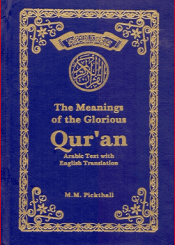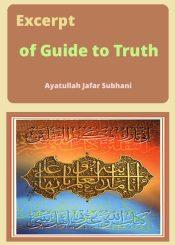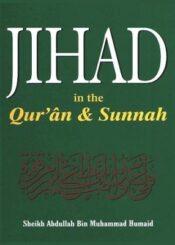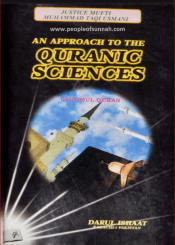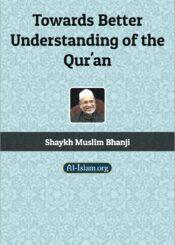Shī`ahs And The Holy Qur`ān
Shī`ahs And The Holy Qur`ān
0 Vote
240 View
ShÄ«`ahs believe that “The Qur`Än is the Divine wahi revealed by AllÄh Almighty to His greatest Prophet (á¹£) in order to explain everything. It is His eternal miracle which has proven that humans are unable to challenge its oratory and clarity. While it contains facts and sublime knowledge, no falsehood can approach it nor can its words be replaced, changed or distorted. What we recite is the same Qur`Än which was revealed to the Prophet (á¹£). Anyone who claims anything else different from this is a violator or a promoter of falsehood or simply confused, and all these are not on the path of guidance. It is the speech of AllÄh (á¹£) which no falsehood can approach from before it or from behind it.â€[130] The mentor of traditionists, Muhammad ibn Ali al-Qummi, who is given the title “al-SadÅ«q†[the truthful], says, “Our belief in as far as the Qur`Än which was revealed by AllÄh Almighty to His Prophet Muhammad (á¹£) is concerned is that it is the one in existence among both branches of the Islamic nation [Sunnis and ShÄ«`ahs], and it is what people have in circulation and nothing more. Anyone who claims that we [ShÄ«`ahs] say anything more than this is a liar.â€[131] The above is underscored by Prof. al-BahinsÄwi, one of the intellectuals of Al-IkhwÄn al-MuslimÅ«n [the Muslim Brotherhood], who adds saying, “The ShÄ«`ah Ja`fari Twelvers are of the view that anyone who distorts the Qur`Än about which all the nation agrees since the dawn of Islam... The book [Qur`Än] which exists among Ahl al-Sunnah is the same in existence at mosques and homes of the ShÄ«`ahs.†He goes on to say the following in the field of rebutting the claims of Zahir and a-Khateeb: “What is known among the Muslims is that the Qur`Än has never suffered any distortion, and that what we have is all the Qur`Än revealed to the greatest Prophet.â€[132] As for Shaykh Muhammad al-GhazÄli, he says the following in his book titled DifÄ` an al-`Aqeeda wal SharÄ«`ah dhidd MatÄ`in al-Mustashriqeen (a defense of the faith and the Islamic legislative system against the charges of the Orientalists): “I heard someone at a scholarly meeting saying that the ShÄ«`ahs have another Qur`Än which is more and less than the well known Qur`Än. I, therefore, said to him, `Where is this Qur`Än? And why neither mankind nor the jinns have seen a copy of it throughout this lengthy history? And why such a charge is created? Why should there be lies against people and against the wahi?`â€[133] As regarding the erroneous “traditions†upon which some people may depend and which claim that the Qur`Än has been distorted and which exists among the ShÄ«`ahs in the books of hadÄ«th, these charges are totally rejected. They are indicted and rejected because their likes exist in the books which the Sunnis consider as containing authentic traditions. Al-BukhÄri has traced a tradition to `Ä€`isha saying, “The Messenger of AllÄh (á¹£) heard a man reciting a [Qur`Änic] chapter at night, so he said to him, `May AllÄh have mercy on him! He has reminded me of such-and-such a verse in such-and-such a chapter...â€[134] Of course, nobody can believe what this “tradition†means and which points to the Messenger of AllÄh (á¹£) NOT knowing the Qur`Än in full by heart, or to his having forgotten some of its verses...! Following are proofs that they found a portion of Surat al-Tawba ONLY with Khuzaymah al-AnsÄri during the compilation of the Qur`Än according to what al-BukhÄri states in his SahÄ«h: Zayd ibn ThÄbit has said, “When we recorded the tablets, I missed a verse from Surat al-AhzÄb which I used to hear the Messenger of AllÄh (á¹£) recite and which I found with none except Khuzaymah al-AnsÄri whose testimony the Messenger of AllÄh (á¹£) equalled to that of two believers: `... Men who proved true to their promise to Allah...`â€[135] And in another narrative by Zayd ibn ThÄbit, the latter said, “... So I traced the Qur`Än, collecting its text from sheets, shoulders and leaves and also from men`s memory till I found from SÅ«rat al-Tawba a couple of verses with Khuzaymah al-AnsÄri which I found with nobody else.â€[136] So, how can one compromise this narrative with the fact that the Qur`Än has been transmitted consecutively?! And among the numerous traditions recorded by al-BukhÄri and other Sunni traditionists in their books of “SahÄ«h†(authentic) traditions and “Musnads†(reliable sources) and which openly claim that the text of the Holy Qur`Än is distorted is one narrated about caliph `Umar ibn al-KhattÄb, with the narrator relying on the authority of AbdullÄh Ibn AbbÄs as follows: “`Umar ibn al-KhattÄb went out. When I saw him coming, I said to Sa`Ä«d ibn Zayd ibn `Amr ibn Nafeel, `Tonight, he [`Umar] will say something which he never said since he became caliph.` He did not like what I said and responded by saying, `What could he tell you what he never said before?` `Umar sat on the pulpit. Once the caller to the prayers finished calling the adhÄn, `Umar stood up then sat on the pulpit. He praised AllÄh as He deserves then said, `Having said what I have said, I am going to make a statement which I am destined to say. I do not know; perhaps I am saying it before my demise. Anyone who understands it and who realizes its significance should disseminate it wherever his destination may be. And if one is afraid he will not realize it, I do not permit him to tell a lie about me. AllÄh sent Muhammad (á¹£) with the truth. He revealed the Book to him. Among what AllÄh revealed was Ayat al-Rajm [the verse of stoning], so we recited it, understood it and absorbed it. The Messenger of AllÄh (á¹£) stoned, and we stoned after him. I am afraid if a long period of time passes by, someone may say, `By AllÄh we do not find the verse of stoning in the Book of AllÄh.` They will thus go astray by abandoning an obligation mandated by AllÄh. Stoning in the Book of AllÄh is right against married men or women once the evidence is established, or when there is a pregnancy, or when one confesses it.â€[137] The other narrative, which is also recorded by al-BukhÄri, explains that `Umar ibn al-KhattÄb wished to add that verse which he, according to his claim, was dropped by himself, but he was afraid of what people might say: “`Umar said, `Had it not been for the possibility that people may say that `Umar increased the text of the Book of AllÄh, I would have written the verse of stoning with my own hand and thus back what instruction the Prophet (á¹£) had had regarding stoning an adulterer in the presence of four witnesses.`â€[138] As for this alleged “verse,†it supposedly says the following: “As for the mid-aged [sheikh] man or woman, if he or she commits adultery, you should absolutely stone them.â€[139] Ibn MÄjah, too, has narrated the same in his SahÄ«h. Since we unequivocally believe that the Qur`Än in our hands has never suffered any diminution or addition, caliph `Umar must have been confused, and the source of this confusion may be the existence of the stoning verse not in the Holy Qur`Än but in the Torah of the People of the Book as this becomes evident from the narrative of Ibn `Umar who says, “A Jew and a Jewess who had committed adultery were both brought to the Prophet (á¹£). He (á¹£) asked the Jews, `What do you do to them?` They said, `We blacken their faces and expose them to shame.` The Prophet (á¹£) said, `Bring me the Torah and recite it if you are telling the truth.` They came with a one-eyed man of their own choice whom they asked to recite. When the man came to a certain place in the verse, he put his hand on it. The Prophet (á¹£) told him to raise his hand. When he did, the stoning verse became quite evident. The man said, `O Muhammad! They are to be stoned, but we have been hiding it among ourselves.` The Prophet (á¹£) ordered them stoned.â€[140] What strengthens the possibility that `Umar was confused between the Wise Book of AllÄh and the Torah of the People of the Book is what al-JazÄ`iri says in his book titled “This is my advice to every Shi`a manâ€. He says the following: “... and how can such distorted and altered books be recited while the Messenger of AllÄh (á¹£) rebuked `Umar ibn al-KhattÄb holding in his hand a sheet of the Torah, so he (á¹£) rebukes him saying, `Have I not brought it [Islam] to you white and pure?!`? The Messenger of AllÄh (á¹£) did not accept that `Umar should even look at one page of the Torah.â€[141] It is also narrated that caliph `Umar had also said, “We used to recite the following in the Book of AllÄh: `If you turn away from your parents, it is apostasy if you turn away from your parents,†or “It is apostasy in you if you turn away from your parents.â€[142] It is not a secret that neither this verse nor its predecessor exists in the Book of AllÄh. As for AbdullÄh ibn Mas`Å«d, it is narrated about him that he used to add both words “al-thakar†(the male) and “al-untha†(the female) to this sacred verse: “By the night as it conceals (the light)†(Qur`Än, 92:1). `Alqamah has said, “... How does AbdullÄh recite `By the night as it conceals (the light)`? I recited to him the following: `By the night as it conceals (the light), and by the daytime when it manifests itself, and by the male and the female...` He said, `By AllÄh! [Thus did] the Messenger of AllÄh (á¹£) recite it to me; from his mouth to mine.â€[143] Thus does al-BukhÄri, who records this incident, let us fall into a new contradiction because he also narrates saying that the Messenger of AllÄh (á¹£) ordered the Muslims to learn how to recite the Qur`Än from AbdullÄh ibn Mas`Å«d. For example, a narrative from Ibn `Umar says that the Messenger of AllÄh (á¹£) used to say, “Learn the recitation of the Qur`Än from four men: AbdullÄh ibn Mas`Å«d...,†thus starting by his name, or he said, “Learn the Qur`Än from four men: AbdullÄh ibn Mas`Å«d, SÄlim slave of AbÅ« Hudhayfah, Ubayy ibn Ka`b and Mu`Ädh ibn Jabal.â€[144] So, how can the Messenger of AllÄh (á¹£) order us to learn how to recite the Qur`Än from those who do not memorize it very well?! We leave the answer to this question to al-BukhÄri, of course, and to those who follow in his footsteps and who believe everything in his SahÄ«h. As for Muslim, the same is found in him, too. `Ä€`isha is quoted as having said, “From among what was revealed in the Qur`Än this: `ten known sucklings.` The Messenger of AllÄh (á¹£) passed away and they were still recited as part of the Qur`Än.â€[145] This claim of `Ä€`isha contains a clear answer to those who advocate narratives such as these have been fabricated; otherwise, what does she mean when she claims that the recitation of such verses went on despite the death of the Prophet (á¹£)?! AbÅ« al-Aswad quotes his father saying, “AbÅ« MÅ«sa al-Ash`ari sent a message to those who recited the Qur`Än in Basra, and they were three hundred men. From among what he said to them was this: `We used to recite a Chapter which we used to liken in its length and strength to [SÅ«rat] BarÄ`a, but I memorized from it only this: `Had the son of Adam had two valleys full of wealth, he would have desired a third, and nothing fills the stomach of the son of Adam except dust`.â€[146] In the book titled Al-ItqÄn fi `Uloom al-Qur`Än by al-SuyÅ«ti, it is stated that some narratives indicate that the Qur`Än has only 112 sÅ«ras (Chapters), or they add two other chapters: those of Hafd and of Khal`[147] or other such narratives from which we believe we have cited enough. Having stated all the above, is it fit for a ShÄ«`ah to say that the Qur`Än of the Sunnis is incomplete, or it has an addition, due to the narrative advocating the same in their books of hadÄ«th? Certainly not. The consensus of the Sunnis is to say that the text of the Qur`Än has never been altered. As for the issue of the existence of narratives saying that such a text has been altered and which exist in books of “SahÄ«h†(authentic) traditions, especially those recorded by al-BukhÄri and Muslim and which the Sunnis have taken upon themselves to accept in their entirety in the pretext that all what is narrated in them is regarded by them as authentic, the interpretation of it is one of two possibilities without the existence of a third: 1) Such narratives are “authentic†but they contain confusion which took place to those who narrated them as is the case with the stoning chapter, or 2) These narratives are not authentic as is the case with the other narratives which we mentioned above. Thus, there is no alternative to reconsidering the labeling of both books by al-BukhÄri and Muslim as the two “SahÄ«h†(authentic) books. How can we, then, explain such a rabid campaign undertaken by writers such as Zahir, al-Khateeb and their likes who accuse the ShÄ«`ahs of distorting the text of the Qur`Än because of the existence of weak traditions in their books of traditions which make such a claim and which they themselves reject especially since their likes are many traditions recorded by Sunni traditionists in their “SahÄ«h†books?! One whose house is made of glass should not throw stones at others` houses. Notes: [130]Muhammad Ridha al-Muzaffar, `AqÄ`id al-ImÄmiyya, p. 41 (third edition). [131]I`tiqÄdÄt al-SadÅ«q. [132]Al-Sunnah al-MuftarÄ `Alayha, p. 60. [133]DifÄ` an al-`Aqeeda wal SharÄ«`ah dhidd MatÄ`in al-Mustashriqeen. [134]Al-BukhÄri, SahÄ«h, Vol. 6, p. 508 in the book dealing with the merits of the Qur`Än in a chapter about forgetting the text of the Qur`Än. [135]Ibid., Vol. 6, p. 291 in the book of tafsÄ«r where “... so among them were those who died..., etc.†is explained. [136]Ibid., Vol. 6, p. 162 in the book of tafsÄ«r in a chapter discussing “... A Messenger has come to you from your own selves...†[137]Ibid., Vol. 8, p. 539 in the book of fighters from among the people of apostasy in a chapter about stoning a woman who became pregnant out of wedlock. [138]Ibid., Vol. 9, p. 212 in the book of AhkÄm (religious injunctions) in a chapter about testimony before a judge. [139]Ibn DÄwÅ«d, Sunan. [140]Al-BukhÄri, SahÄ«h, Vol. 9, p. 476 in the book of TawhÄ«d in a chapter about what can be interpreted of the Torah. [141]AbÅ« Bakr al-JazÄ`iri, This is my Advice to Every ShÄ«`ah man. [142]Al-BukhÄri, SahÄ«h, Vol. 8, p. 540 in the book of fighters from among the people of apostasy in a chapter about stoning a woman who became pregnant through adultery. [143]Ibid., Vol. 5, p. 71 in the book dealing with the virtues of the sahÄbah in a chapter about the merits of AbdullÄh ibn Mas`Å«d. [144]Ibid., Vol. 5, p. 71 in the book dealing with the virtues of the sahÄbah in a chapter about the merits of AbdullÄh ibn Mas`Å«d. [145]Muslim, SahÄ«h, Vol. 2, p. 1075 (edition of DÄr IhyÄ` al-TurÄth al-`Arabi) in the book of nursing babies in a chapter about prohibition in five sucklings. [146]Ibid., Vol. 2, p. 726 in the book of zakÄt (edition of DÄr IhyÄ` al-TurÄth al-`Arabi) in a chapter titled “Had the son of Adam had two valleys full of wealth, he would have desired a thirdâ€. [147]al-SuyÅ«ti, Al-ItqÄn fi `Uloom al-Qur`Än, p. 65. Source: al-shia.org

